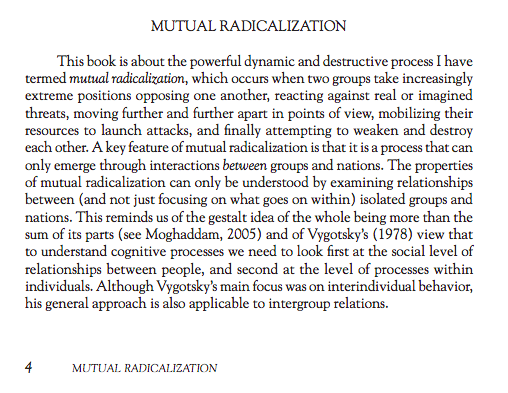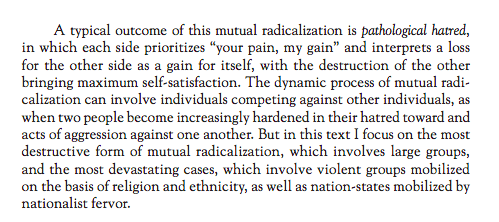1. Thread of deradicalization stories.
I’ve tweeted some of these links before, but I decided I wanted to collect my favorites stories in one place. This is just a small sampling of these types of stories—I’m sure there are many I’ve never seen before.
I’ve tweeted some of these links before, but I decided I wanted to collect my favorites stories in one place. This is just a small sampling of these types of stories—I’m sure there are many I’ve never seen before.
2. I’ve been reading these extremist deradicalization stories for years—
ex-Islamists,
ex-Scientologists,
ex-Amish/Mennonite,
ex-white supremacists,
ex-fundamentalist Christians
and more recently ex-social justice activists.
ex-Islamists,
ex-Scientologists,
ex-Amish/Mennonite,
ex-white supremacists,
ex-fundamentalist Christians
and more recently ex-social justice activists.
3. Obviously the hard work of deradicalization has to be done primarily by the entangled individual, but if you’ve ever wondered how you can help that process along, …
4. … the message I keep finding over and over again is—
find your common humanity with them, whoever they are and however odious you find some of their views and treat them as you would want to be treated.
find your common humanity with them, whoever they are and however odious you find some of their views and treat them as you would want to be treated.
5. Doing otherwise results in a process of interactive escalation and leads to mutual/reciprocal radicalization.
https://web.archive.org/save/https://www.radicalisationresearch.org/debate/busher-reciprocal-radicalisation-wider-dynamics/ https://www.radicalisationresearch.org/debate/busher-reciprocal-radicalisation-wider-dynamics/
https://web.archive.org/save/https://www.radicalisationresearch.org/debate/busher-reciprocal-radicalisation-wider-dynamics/ https://www.radicalisationresearch.org/debate/busher-reciprocal-radicalisation-wider-dynamics/
6. Excepts from "Mutual Radicalization: How Groups and Nations Drive Each Other to Extremes” by Fathali M. Moghaddam, Professor of Psychology at Georgetown University.
http://fathalimoghaddam.com/
https://www.apa.org/pubs/books/4318154
http://fathalimoghaddam.com/
https://www.apa.org/pubs/books/4318154
7. While these terms come from counter extremism research that studies actual violence, I see similar patterns in online radicalization.
8. I have yet to come across a single story or research that says that ostracism, name-calling or violence were instrumental to extremists rethinking their views.
9. I’ve included archive links in case these articles disappear/move or in case you run up against a paywall.
10. How Megan Phelps-Roper escaped the church she was born into, a breakaway Baptist church that some liken to a cult. (Not naming them because they retweet.)
https://en.wikipedia.org/wiki/Westboro_Baptist_Church
https://web.archive.org/web/20151118183658/https://www.newyorker.com/magazine/2015/11/23/conversion-via-twitter-westboro-baptist-church-megan-phelps-roper https://www.newyorker.com/magazine/2015/11/23/conversion-via-twitter-westboro-baptist-church-megan-phelps-roper
https://en.wikipedia.org/wiki/Westboro_Baptist_Church
https://web.archive.org/web/20151118183658/https://www.newyorker.com/magazine/2015/11/23/conversion-via-twitter-westboro-baptist-church-megan-phelps-roper https://www.newyorker.com/magazine/2015/11/23/conversion-via-twitter-westboro-baptist-church-megan-phelps-roper
11. Megan’s grandfather was an early pastor and the one who broke ties with the East Side Baptist Church to form his own church.
12. What I found most interesting about her story is how strangers on Twitter & journalists who came to their home were critical in showing her a different way to view the world.
13. People are always complaining about what a dumpster fire Twitter is, but for someone with limited access to people who believe different things, Twitter can open the world to them.
14. Megan was on the Waking Up with Sam Harris podcast (now called Making Sense) on 7/3/15.
https://samharris.org/podcasts/leaving-the-church/
https://samharris.org/podcasts/leaving-the-church/
15. Kenneth Kopp, who was born into a Lutheran family, raised Pentecostal, and then joined Mennonite & Amish communities where he lived for ~32 years was deradicalized by a photographer friend & re-learning about science. Video is worth watching. https://bangordailynews.com/2017/07/03/homestead/former-amish-man-creates-his-own-simple-life-minus-the-religion/
17. Archive for article in tweet #15: https://web.archive.org/web/20170706082250/https://bangordailynews.com/2017/07/03/homestead/former-amish-man-creates-his-own-simple-life-minus-the-religion/
Archive for article in tweet #16: https://web.archive.org/web/20151124115219/https://bangordailynews.com/2015/09/05/living/conversations-with-maine-lifestyle/thorndike-woodworker-devoted-to-sustainability-amish-atheism/
Archive for article in tweet #16: https://web.archive.org/web/20151124115219/https://bangordailynews.com/2015/09/05/living/conversations-with-maine-lifestyle/thorndike-woodworker-devoted-to-sustainability-amish-atheism/
18. Kenneth talked to Sean McGuire on the My Secret Atheist Podcast on 10/16/15. He went into more detail about his personal process of questioning in this interview.
19. Former white nationalist Derek Black who was raised in that life by his family and was a godson of David Duke got out because of engagement from college classmates over weekly Shabbat dinners.
https://web.archive.org/web/20161016051640/https://www.washingtonpost.com/national/the-white-flight-of-derek-black/2016/10/15/ed5f906a-8f3b-11e6-a6a3-d50061aa9fae_story.html https://www.washingtonpost.com/national/the-white-flight-of-derek-black/2016/10/15/ed5f906a-8f3b-11e6-a6a3-d50061aa9fae_story.html
https://web.archive.org/web/20161016051640/https://www.washingtonpost.com/national/the-white-flight-of-derek-black/2016/10/15/ed5f906a-8f3b-11e6-a6a3-d50061aa9fae_story.html https://www.washingtonpost.com/national/the-white-flight-of-derek-black/2016/10/15/ed5f906a-8f3b-11e6-a6a3-d50061aa9fae_story.html
20. Derek:
“Through many talks with devoted and diverse people there — people who chose to invite me into their dorms and conversations rather than ostracize me — I began to realize the damage I had done.”
(Source below.)
“Through many talks with devoted and diverse people there — people who chose to invite me into their dorms and conversations rather than ostracize me — I began to realize the damage I had done.”
(Source below.)
21. It was important is that these conversations between Derek and his classmates happened offline, face to face.
22. Link for quote in tweet #20.
https://web.archive.org/web/20161127053720/https://www.nytimes.com/2016/11/26/opinion/sunday/why-i-left-white-nationalism.html https://www.nytimes.com/2016/11/26/opinion/sunday/why-i-left-white-nationalism.html
https://web.archive.org/web/20161127053720/https://www.nytimes.com/2016/11/26/opinion/sunday/why-i-left-white-nationalism.html https://www.nytimes.com/2016/11/26/opinion/sunday/why-i-left-white-nationalism.html
23. Derek and his friend Matthew Stevenson, the host of the Shabbat dinners, spoke with Krista Tippett at the 2018 Global Issues Forum at the US Holocaust Memorial Museum and it was broadcast on On Being on 5/17/18. https://onbeing.org/programs/how-friendship-and-quiet-conversations-transformed-a-white-nationalist-may2018/
24. Derek does mention that hearing the anger his views caused people was an important part of his journey although he does emphasize that anger alone would never have been enough to get him to change.
25. Important to note that for some people anger and violence from the other side just fuels their own rage/violence/fear, as with the stories below.
26. @MaajidNawaz, a British Pakistani former Islamist (a leader of Hizb ut-Tahrir), was adopted as a Prisoner of Conscience by Amnesty international in 2004 while he was imprisoned for political activity in Egypt.
https://web.archive.org/web/20190106180142/https://www.amnestyusa.org/the-story-of-maajid-nawaz/ https://www.amnestyusa.org/the-story-of-maajid-nawaz/
https://web.archive.org/web/20190106180142/https://www.amnestyusa.org/the-story-of-maajid-nawaz/ https://www.amnestyusa.org/the-story-of-maajid-nawaz/
27. Being adopted by Amnesty planted a seed that caused him to question his beliefs and conversations with fellow inmates led Maajid out of Islamist extremism.
Maajid also credits his Muslim mother as the “first counter extremist I ever met”. (@ 21:04 - link below.)
Maajid also credits his Muslim mother as the “first counter extremist I ever met”. (@ 21:04 - link below.)
28. Maajid is the founding chairman of the Quilliam Foundation, a UK-based counter-extremism think tank. He remains controversial as he advocates for Islamic reform.
https://www.quilliaminternational.com/
https://www.quilliaminternational.com/
29. Maajid interviewed Søren Lerche, a Danish former member of a violent antifa group, at the 2016 One Young World Summit in Ottawa.
30. Søren credits letters from his parents and sister when he was in prison (@ 19:24) for helping pull him away from extremism and to continuing his education (finishing high school & going to university).
31. In response to a question from Maajid about what patterns Søren sees in people who get into left/right/Islamist extremism:
32. Søren @ 23:45:
“I think most of us are some kind of hurt—that we don’t feel belonging in the society, that we create our own community that is opposed to the society and then we want to create a better world.”
“I think most of us are some kind of hurt—that we don’t feel belonging in the society, that we create our own community that is opposed to the society and then we want to create a better world.”
33. Søren on the need to keep dialogue open @ 24:32:
“…we cannot just say we don't want to discuss this—that we have the right—we have to be in dialogue constantly and then aim of the best the same goal as bringing people together…”
“…we cannot just say we don't want to discuss this—that we have the right—we have to be in dialogue constantly and then aim of the best the same goal as bringing people together…”
34. Maajid and Søren also talked about the importance of families with a family member entangled with extremism finding support from other families who are going through the same thing.
35. Even if a person gets involved with extremism independent of their family, it still affects the whole family.
36. Søren, on what he’s learned through his work and friendship with former neo-Nazis @ 7:53:
37.
“I have seen that many of them are hurt children that hurt other children that I have managed now to look behind the anger, behind the violence, and I think it’s the best way to address violence is to see the individual—the person—behind the swastika and not hurt them.”
“I have seen that many of them are hurt children that hurt other children that I have managed now to look behind the anger, behind the violence, and I think it’s the best way to address violence is to see the individual—the person—behind the swastika and not hurt them.”
38. Maajid said he refers to this process as “rehumanization” after “you have defined the other and that other is just this thing—this nonhuman object—that is the enemy.”
39. Maajid @ 8:49
“I think the process of rehumanization in deradicalization is crucial, but how do you go about broaching a conversation with somebody you can't even get near because there's a there's a barrier and that barrier is violence?”
“I think the process of rehumanization in deradicalization is crucial, but how do you go about broaching a conversation with somebody you can't even get near because there's a there's a barrier and that barrier is violence?”
40. Did you find this thread helpful/educational? Please feel free to elaborate in replies. I'm thinking of doing a series of threads on deradicalization and counter extremism.
41. Forgot to include this amazing interview with Søren for the TERRA Toolkit, “a Europe-wide network-based prevention and learning project, funded by the European Commission, DG Home Affairs”.
https://terratoolkit.eu
https://ec.europa.eu/home-affairs/content/terra-toolkit_en https://vimeo.com/113623893
https://terratoolkit.eu
https://ec.europa.eu/home-affairs/content/terra-toolkit_en https://vimeo.com/113623893
42. Just came across this error. The man's name is Kenneth Copp, not Kopp.  https://twitter.com/keikoinboston/status/1139364311128772610?s=20
https://twitter.com/keikoinboston/status/1139364311128772610?s=20
 https://twitter.com/keikoinboston/status/1139364311128772610?s=20
https://twitter.com/keikoinboston/status/1139364311128772610?s=20

 Read on Twitter
Read on Twitter



